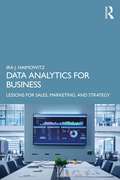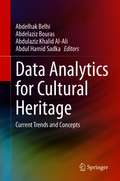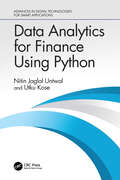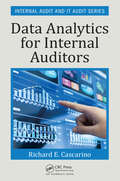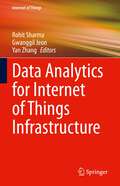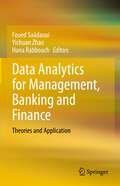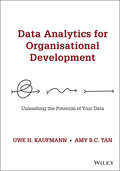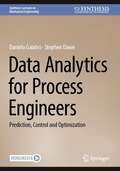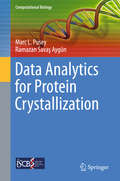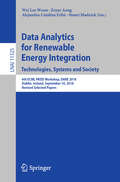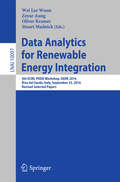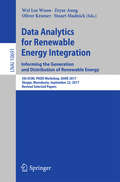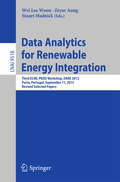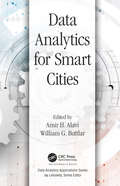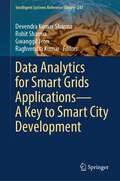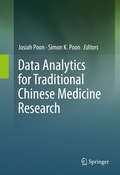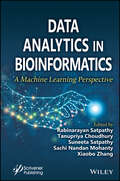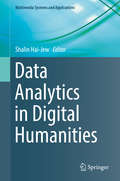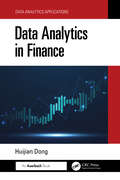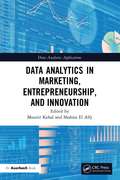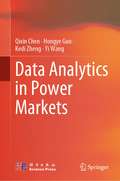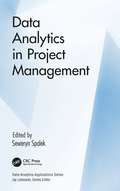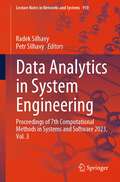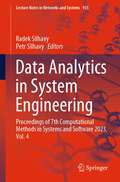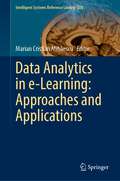- Table View
- List View
Data Analytics for Business: Lessons for Sales, Marketing, and Strategy
by Ira J. HaimowitzInterest in applying analytics, machine learning, and artificial intelligence to sales and marketing has grown dramatically, with no signs of slowing down. This book provides essential guidance to apply advanced analytics and data mining techniques to real-world business applications. The foundation of this text is the author’s 20-plus years of developing and delivering big data and artificial intelligence solutions across multiple industries: financial services, pharmaceuticals, consumer packaged goods, media, and retail. He provides guidelines and summarized cases for those studying or working in the fields of data science, data engineering, and business analytics. The book also offers a distinctive style: a series of essays, each of which summarizes a critical lesson or provides a step-by-step business process, with specific examples of successes and failures. Sales and marketing executives, project managers, business and engineering professionals, and graduate students will find this clear and comprehensive book the ideal companion when navigating the complex world of big data analytics.
Data Analytics for Cultural Heritage: Current Trends and Concepts
by Abdelaziz Bouras Abdul Hamid Sadka Abdelhak Belhi Abdulaziz Khalid Al-AliThis book considers the challenges related to the effective implementation of artificial intelligence (AI) and machine learning (ML) technologies to the cultural heritage digitization process. Particular focus is placed on improvements to the data acquisition stage, as well as the data enrichment and curation stages, using advanced artificial intelligence techniques and tools. An emphasis is placed on recent applications related to deep learning for visual recognition, generative models, natural language processing, and super resolution. The book is a valuable reference for researchers working in the multidisciplinary field of cultural heritage and AI, as well as professional experts in the art and culture domains, such as museums, libraries, and historic sites and buildings. Reports on techniques and methods that leverage AI and machine learning and their impact on the digitization of cultural heritage; Addresses challenges of improving data acquisition, enrichment and management processes;Highlights contributions from international researchers from diverse fields and subject areas.
Data Analytics for Finance Using Python (Advances in Digital Technologies for Smart Applications)
by Nitin Jaglal Untwal Utku KoseUnlock the power of data analytics in finance with this comprehensive guide. Data Analytics for Finance Using Python is your key to unlocking the secrets of the financial markets.In this book, you’ll discover how to harness the latest data analytics techniques, including machine learning and inferential statistics, to make informed investment decisions and drive business success. With a focus on practical application, this book takes you on a journey from the basics of data preprocessing and visualization to advanced modeling techniques for stock price prediction.Through real-world case studies and examples, you’ll learn how to: Uncover hidden patterns and trends in financial data Build predictive models that drive investment decisions Optimize portfolio performance using data-driven insights Stay ahead of the competition with cutting-edge data analytics techniques Whether you’re a finance professional seeking to enhance your data analytics skills or a researcher looking to advance the field of finance through data-driven insights, this book is an essential resource. Dive into the world of data analytics in finance and discover the power to make informed decisions, drive business success, and stay ahead of the curve.This book will be helpful for students, researchers, and users of machine learning and financial tools in the disciplines of commerce, management, and economics.
Data Analytics for Internal Auditors (Security, Audit and Leadership Series #9)
by Richard E. CascarinoThere are many webinars and training courses on Data Analytics for Internal Auditors, but no handbook written from the practitioner’s viewpoint covering not only the need and the theory, but a practical hands-on approach to conducting Data Analytics. The spread of IT systems makes it necessary that auditors as well as management have the ability to examine high volumes of data and transactions to determine patterns and trends. The increasing need to continuously monitor and audit IT systems has created an imperative for the effective use of appropriate data mining tools. This book takes an auditor from a zero base to an ability to professionally analyze corporate data seeking anomalies.
Data Analytics for Internet of Things Infrastructure (Internet of Things)
by Rohit Sharma Yan Zhang Gwanggil JeonThis book provides techniques for the deployment of semantic technologies in data analysis along with the latest applications across the field such as Internet of Things (IoT). The authors focus on the use of the IoT and big data in business intelligence, data management, Hadoop, machine learning, cloud, smart cities, etc. They discuss how the generation of big data by IoT has ruptured the existing data processing capacity of IoT and recommends the adoption of data analytics to strengthen solutions. The book addresses the challenges in designing the web based IoT system, provides a comparative analysis of different advanced approaches in industries, and contains an analysis of databases to provide expert systems. The book aims to bring together leading academic scientists, researchers, and research scholars to exchange and share their experiences and research results on all aspects of IoT and big data analytics.
Data Analytics for Management, Banking and Finance: Theories and Application
by Yichuan Zhao Foued Saâdaoui Hana RabbouchThis book is a practical guide on the use of various data analytics and visualization techniques and tools in the banking and financial sectors. It focuses on how combining expertise from interdisciplinary areas, such as machine learning and business analytics, can bring forward a shared vision on the benefits of data science from the research point of view to the evaluation of policies. It highlights how data science is reshaping the business sector. It includes examples of novel big data sources and some successful applications on the use of advanced machine learning, natural language processing, networks analysis, and time series analysis and forecasting, among others, in the banking and finance.It includes several case studies where innovative data science models is used to analyse, test or model some crucial phenomena in banking and finance. At the same time, the book is making an appeal for a further adoption of these novel applications in the field of economics and finance so that they can reach their full potential and support policy-makers and the related stakeholders in the transformational recovery of our societies.The book is for stakeholders involved in research and innovation in the banking and financial sectors, but also those in the fields of computing, IT and managerial information systems, helping through this new theory to better specify the new opportunities and challenges. The many real cases addressed in this book also provide a detailed guide allowing the reader to realize the latest methodological discoveries and the use of the different Machine Learning approaches (supervised, unsupervised, reinforcement, deep, etc.) and to learn how to use and evaluate performance of new data science tools and frameworks
Data Analytics for Organisational Development: Unleashing the Potential of Your Data
by Uwe H. Kaufmann Amy B. TanA practical guide for anyone who aspires to become data analytics–savvy Data analytics has become central to the operation of most businesses, making it an increasingly necessary skill for every manager and for all functions across an organisation. Data Analytics for Organisational Development: Unleashing the Potential of Your Data introduces a methodical process for gathering, screening, transforming, and analysing the correct datasets to ensure that they are reliable tools for business decision-making. Written by a Six Sigma Master Black Belt and a Lean Six Sigma Black Belt, this accessible guide explains and illustrates the application of data analytics for organizational development and design, with particular focus on Customer and Strategy Analytics, Operations Analytics and Workforce Analytics. Designed as both a handbook and workbook, Data Analytics for Organisational Development presents the application of data analytics for organizational design and development using case studies and practical examples. It aims to help build a bridge between data scientists, who have less exposure to actual business issues, and the "non-data scientists." With this guide, anyone can learn to perform data analytics tasks from translating a business question into a data science hypothesis to understanding the data science results and making the appropriate decisions. From data acquisition, cleaning, and transformation to analysis and decision making, this book covers it all. It also helps you avoid the pitfalls of unsound decision making, no matter where in the value chain you work. Follow the “Five Steps of a Data Analytics Case” to arrive at the correct business decision based on sound data analysis Become more proficient in effectively communicating and working with the data experts, even if you have no background in data science Learn from cases and practical examples that demonstrate a systematic method for gathering and processing data accurately Work through end-of-chapter exercises to review key concepts and apply methods using sample data sets Data Analytics for Organisational Development includes downloadable tools for learning enrichment, including spreadsheets, Power BI slides, datasets, R analysis steps and more. Regardless of your level in your organisation, this book will help you become savvy with data analytics, one of today’s top business tools.
Data Analytics for Process Engineers: Prediction, Control and Optimization (Synthesis Lectures on Mechanical Engineering)
by Daniela Galatro Stephen DaweThis book provides an industry-oriented data analytics approach for process engineers, including data acquisition methods and sources, exploratory data analysis and sensitivity analysis, data-based modelling for prediction, data-based modelling for monitoring and control, and data-based optimization of processes. While many of the current data analytics books target business-related problems, the rationale for this book is a specific need to understand and select applicable data analytics approaches pragmatically to analyze process engineering–related problems; this tailored solution for engineers gets amalgamated with governing equations, and in several cases, with the physical understanding of the phenomenon being analyzed. We also consider this book strategically conceived to help map Education 4.0 with Industry 4.0 since it can support undergraduate and graduate students to gain valuable and applicable data analytics stills that can be further used in their workplace. Moreover, it can be used as a reference book for professionals, a quick reference to data analytics tools that can facilitate and/or optimize their process engineering tasks.
Data Analytics for Protein Crystallization
by Marc L. Pusey Ramazan Savaş AygünThis unique text/reference presents an overview of the computational aspects of protein crystallization, describing how to build robotic high-throughput and crystallization analysis systems. The coverage encompasses the complete data analysis cycle, including the set-up of screens by analyzing prior crystallization trials, the classification of crystallization trial images by effective feature extraction, the analysis of crystal growth in time series images, the segmentation of crystal regions in images, the application of focal stacking methods for crystallization images, and the visualization of trials.Topics and features: describes the fundamentals of protein crystallization, and the scoring and categorization of crystallization image trials; introduces a selection of computational methods for protein crystallization screening, and the hardware and software architecture for a basic high-throughput system; presents an overview of the image features used in protein crystallization classification, and a spatio-temporal analysis of protein crystal growth; examines focal stacking techniques to avoid blurred crystallization images, and different thresholding methods for binarization or segmentation; discusses visualization methods and software for protein crystallization analysis, and reviews alternative methods to X-ray diffraction for obtaining structural information; provides an overview of the current challenges and potential future trends in protein crystallization.This interdisciplinary work serves as an essential reference on the computational and data analytics components of protein crystallization for the structural biology community, in addition to computer scientists wishing to enter the field of protein crystallization.
Data Analytics for Renewable Energy Integration. Technologies, Systems and Society: 6th ECML PKDD Workshop, DARE 2018, Dublin, Ireland, September 10, 2018, Revised Selected Papers (Lecture Notes in Computer Science #11325)
by Wei Lee Woon Zeyar Aung Stuart Madnick Alejandro Catalina FeliúThis book constitutes the revised selected papers from the 6th ECML PKDD Workshop on Data Analytics for Renewable Energy Integration, DARE 2018, held in Dublin, Ireland, in September 2018. The 9 papers presented in this volume were carefully reviewed and selected for inclusion in this book and handle topics such as time series forecasting, the detection of faults, cyber security, smart grid and smart cities, technology integration, demand response, and many others.
Data Analytics for Renewable Energy Integration: 4th ECML PKDD Workshop, DARE 2016, Riva del Garda, Italy, September 23, 2016, Revised Selected Papers (Lecture Notes in Computer Science #10097)
by Oliver Kramer Wei Lee Woon Zeyar Aung Stuart MadnickThis book constitutes revised selected papers from the second ECML PKDD Workshop on Data Analytics for Renewable Energy Integration, DARE 2014, held in Nancy, France, in September 2014. The 11 papers presented in this volume were carefully reviewed and selected for inclusion in this book.
Data Analytics for Renewable Energy Integration: 5th ECML PKDD Workshop, DARE 2017, Skopje, Macedonia, September 22, 2017, Revised Selected Papers (Lecture Notes in Computer Science #10691)
by Wei Lee Woon, Zeyar Aung, Oliver Kramer and Stuart MadnickThis book constitutes revised selected papers from the 5th ECML PKDD Workshop on Data Analytics for Renewable Energy Integration, DARE 2017, held in Skopje, Macedonia, in September 2017. The 11 papers presented in this volume were carefully reviewed and selected for inclusion in this book and handle topics such as time series forecasting, the detection of faults, cyber security, smart grid and smart cities, technology integration, demand response and many others.
Data Analytics for Renewable Energy Integration: Third ECML PKDD Workshop, DARE 2015, Porto, Portugal, September 11, 2015. Revised Selected Papers (Lecture Notes in Computer Science #9518)
by Wei Lee Woon Zeyar Aung Stuart MadnickThis book constitutes revised selected papers from the second ECML PKDD Workshop on Data Analytics for Renewable Energy Integration, DARE 2014, held in Nancy, France, in September 2014. The 11 papers presented in this volume were carefully reviewed and selected for inclusion in this book.
Data Analytics for Smart Cities (Data Analytics Applications)
by William G. Buttlar Amir AlaviThe development of smart cities is one of the most important challenges over the next few decades. Governments and companies are leveraging billions of dollars in public and private funds for smart cities. Next generation smart cities are heavily dependent on distributed smart sensing systems and devices to monitor the urban infrastructure. The smart sensor networks serve as autonomous intelligent nodes to measure a variety of physical or environmental parameters. They should react in time, establish automated control, and collect information for intelligent decision-making. In this context, one of the major tasks is to develop advanced frameworks for the interpretation of the huge amount of information provided by the emerging testing and monitoring systems. Data Analytics for Smart Cities brings together some of the most exciting new developments in the area of integrating advanced data analytics systems into smart cities along with complementary technological paradigms such as cloud computing and Internet of Things (IoT). The book serves as a reference for researchers and engineers in domains of advanced computation, optimization, and data mining for smart civil infrastructure condition assessment, dynamic visualization, intelligent transportation systems (ITS), cyber-physical systems, and smart construction technologies. The chapters are presented in a hands-on manner to facilitate researchers in tackling applications. Arguably, data analytics technologies play a key role in tackling the challenge of creating smart cities. Data analytics applications involve collecting, integrating, and preparing time- and space-dependent data produced by sensors, complex engineered systems, and physical assets, followed by developing and testing analytical models to verify the accuracy of results. This book covers this multidisciplinary field and examines multiple paradigms such as machine learning, pattern recognition, statistics, intelligent databases, knowledge acquisition, data visualization, high performance computing, and expert systems. The book explores new territory by discussing the cutting-edge concept of Big Data analytics for interpreting massive amounts of data in smart city applications.
Data Analytics for Smart Grids Applications—A Key to Smart City Development (Intelligent Systems Reference Library #247)
by Rohit Sharma Raghvendra Kumar Devendra Kumar Sharma Gwanggil JeonThis book introduces big data analytics and corresponding applications in smart grids. The characterizations of big data, smart grids as well as a huge amount of data collection are first discussed as a prelude to illustrating the motivation and potential advantages of implementing advanced data analytics in smart grids. Basic concepts and the procedures of typical data analytics for general problems are also discussed. The advanced applications of different data analytics in smart grids are addressed as the main part of this book. By dealing with a huge amount of data from electricity networks, meteorological information system, geographical information system, etc., many benefits can be brought to the existing power system and improve customer service as well as social welfare in the era of big data. However, to advance the applications of big data analytics in real smart grids, many issues such as techniques, awareness, and synergies have to be overcome. This book provides deployment of semantic technologies in data analysis along with the latest applications across the field such as smart grids.
Data Analytics for Traditional Chinese Medicine Research
by Josiah Poon Simon K. PoonThis contributed volume explores how data mining, machine learning, and similar statistical techniques can analyze the types of problems arising from Traditional Chinese Medicine (TCM) research. The book focuses on the study of clinical data and the analysis of herbal data. Challenges addressed include diagnosis, prescription analysis, ingredient discoveries, network based mechanism deciphering, pattern-activity relationships, and medical informatics. Each author demonstrates how they made use of machine learning, data mining, statistics and other analytic techniques to resolve their research challenges, how successful if these techniques were applied, any insight noted and how these insights define the most appropriate future work to be carried out. Readers are given an opportunity to understand the complexity of diagnosis and treatment decision, the difficulty of modeling of efficacy in terms of herbs, the identification of constituent compounds in an herb, the relationship between these compounds and biological outcome so that evidence-based predictions can be made. Drawing on a wide range of experienced contributors, Data Analytics for Traditional Chinese Medicine Research is a valuable reference for professionals and researchers working in health informatics and data mining. The techniques are also useful for biostatisticians and health practitioners interested in traditional medicine and data analytics.
Data Analytics in Bioinformatics: A Machine Learning Perspective
by Xiaobo Zhang Suneeta Satpathy Sachi Nandan Mohanty Tanupriya Choudhury Rabinarayan SatpathyMachine learning techniques are increasingly being used to address problems in computational biology and bioinformatics. Novel machine learning computational techniques to analyze high throughput data in the form of sequences, gene and protein expressions, pathways, and images are becoming vital for understanding diseases and future drug discovery. Machine learning techniques such as Markov models, support vector machines, neural networks, and graphical models have been successful in analyzing life science data because of their capabilities in handling randomness and uncertainty of data noise and in generalization. Machine Learning in Bioinformatics compiles recent approaches in machine learning methods and their applications in addressing contemporary problems in bioinformatics approximating classification and prediction of disease, feature selection, dimensionality reduction, gene selection and classification of microarray data and many more.
Data Analytics in Digital Humanities (Multimedia Systems and Applications)
by Shalin Hai-JewThis book covers computationally innovative methods and technologies including data collection and elicitation, data processing, data analysis, data visualizations, and data presentation. It explores how digital humanists have harnessed the hypersociality and social technologies, benefited from the open-source sharing not only of data but of code, and made technological capabilities a critical part of humanities work. Chapters are written by researchers from around the world, bringing perspectives from diverse fields and subject areas. The respective authors describe their work, their research, and their learning. Topics include semantic web for cultural heritage valorization, machine learning for parody detection by classification, psychological text analysis, crowdsourcing imagery coding in natural disasters, and creating inheritable digital codebooks. Designed for researchers and academics, this book is suitable for those interested in methodologies and analytics that can be applied in literature, history, philosophy, linguistics, and related disciplines. Professionals such as librarians, archivists, and historians will also find the content informative and instructive.
Data Analytics in Finance (Data Analytics Applications)
by Huijian DongData Analytics in Finance covers the methods and application of data analytics in all major areas of finance, including buy-side investments, sell-side investment banking, corporate finance, consumer finance, financial services, real estate, insurance, and commercial banking. It explains statistical inference of big data, financial modeling, machine learning, database querying, data engineering, data visualization, and risk analysis. Emphasizing financial data analytics practices with a solution- oriented purpose, it is a “one-stop-shop” of all the major data analytics aspects for each major finance area.The book paints a comprehensive picture of the data analytics process including: Statistical inference of big data Financial modeling Machine learning and AI Database querying Data engineering Data visualization Risk analysis Each chapter is crafted to provide complete guidance for many subject areas including investments, fraud detection, and consumption finance. Avoiding data analytics methods widely available elsewhere, the book focuses on providing data analytics methods specifically applied to key areas of finance. Written as a roadmap for researchers, practitioners, and students to master data analytics instruments in finance, the book also provides a collection of indispensable resources for the readers’ reference. Offering the knowledge and tools necessary to thrive in a data-driven financial landscape, this book enables readers to deepen their understanding of investments, develop new approaches to risk management, and apply data analytics to finance.
Data Analytics in Marketing, Entrepreneurship, and Innovation (Data Analytics Applications)
by Mounir Kehal Shahira El AlfyInnovation based in data analytics is a contemporary approach to developing empirically supported advances that encourage entrepreneurial activity inspired by novel marketing inferences. Data Analytics in Marketing, Entrepreneurship, and Innovation covers techniques, processes, models, tools, and practices for creating business opportunities through data analytics. It features case studies that provide realistic examples of applications. This multifaceted examination of data analytics looks at: Business analytics Applying predictive analytics Using discrete choice analysis for decision-making Marketing and customer analytics Developing new products Technopreneurship Disruptive versus incremental innovation The book gives researchers and practitioners insight into how data analytics is used in the areas of innovation, entrepreneurship, and marketing. Innovation analytics helps identify opportunities to develop new products and services, and improve existing methods of product manufacturing and service delivery. Entrepreneurial analytics facilitates the transformation of innovative ideas into strategy and helps entrepreneurs make critical decisions based on data-driven techniques. Marketing analytics is used in collecting, managing, assessing, and analyzing marketing data to predict trends, investigate customer preferences, and launch campaigns.
Data Analytics in Power Markets
by Yi Wang Qixin Chen Hongye Guo Kedi ZhengThis book aims to solve some key problems in the decision and optimization procedure for power market organizers and participants in data-driven approaches. It begins with an overview of the power market data and analyzes on their characteristics and importance for market clearing. Then, the first part of the book discusses the essential problem of bus load forecasting from the perspective of market organizers. The related works include load uncertainty modeling, bus load bad data correction, and monthly load forecasting. The following part of the book answers how much information can be obtained from public data in locational marginal price (LMP)-based markets. It introduces topics such as congestion identification, componential price forecasting, quantifying the impact of forecasting error, and financial transmission right investment. The final part of the book answers how to model the complex market bidding behaviors. Specific works include pattern extraction, aggregated supply curve forecasting, market simulation, and reward function identification in bidding. These methods are especially useful for market organizers to understand the bidding behaviors of market participants and make essential policies. It will benefit and inspire researchers, graduate students, and engineers in the related fields.
Data Analytics in Project Management (Data Analytics Applications)
by Seweryn SpalekThis book aims to help the reader better understand the importance of data analysis in project management. Moreover, it provides guidance by showing tools, methods, techniques and lessons learned on how to better utilize the data gathered from the projects. First and foremost, insight into the bridge between data analytics and project management aids practitioners looking for ways to maximize the practical value of data procured. The book equips organizations with the know-how necessary to adapt to a changing workplace dynamic through key lessons learned from past ventures. The book’s integrated approach to investigating both fields enhances the value of research findings.
Data Analytics in System Engineering: Proceedings of 7th Computational Methods in Systems and Software 2023, Vol. 3 (Lecture Notes in Networks and Systems #910)
by Radek Silhavy Petr SilhavyThese proceedings offer an insightful exploration of integrating data analytics in system engineering. This book highlights the essential role of data in driving innovation, optimizing processes, and solving complex challenges in the field. Targeted at industry professionals, researchers, and enthusiasts, this book serves as a comprehensive resource, providing actionable insights and showcasing transformative applications of data in engineering. It is a must-read for anyone keen on understanding and participating in the ongoing evolution of system engineering in our data-centric world.
Data Analytics in System Engineering: Proceedings of 7th Computational Methods in Systems and Software 2023, Vol. 4 (Lecture Notes in Networks and Systems #935)
by Radek Silhavy Petr SilhavyThese proceedings offer an insightful exploration of integrating data analytics in system engineering. This book highlights the essential role of data in driving innovation, optimizing processes, and solving complex challenges in the field. Targeted at industry professionals, researchers, and enthusiasts, this book serves as a comprehensive resource, providing actionable insights and showcasing transformative applications of data in engineering. It is a must-read for anyone keen on understanding and participating in the ongoing evolution of system engineering in our data-centric world.
Data Analytics in e-Learning: Approaches and Applications (Intelligent Systems Reference Library #220)
by Marian Cristian MihăescuThis book focuses on research and development aspects of building data analytics workflows that address various challenges of e-learning applications. This book represents a guideline for building a data analysis workflow from scratch. Each chapter presents a step of the entire workflow, starting from an available dataset and continuing with building interpretable models, enhancing models, and tackling aspects of evaluating engagement and usability. The related work shows that many papers have focused on machine learning usage and advancement within e-learning systems. However, limited discussions have been found on presenting a detailed complete roadmap from the raw dataset up to the engagement and usability issues. Practical examples and guidelines are provided for designing and implementing new algorithms that address specific problems or functionalities. This roadmap represents a potential resource for various advances of researchers and practitioners in educational data mining and learning analytics.
